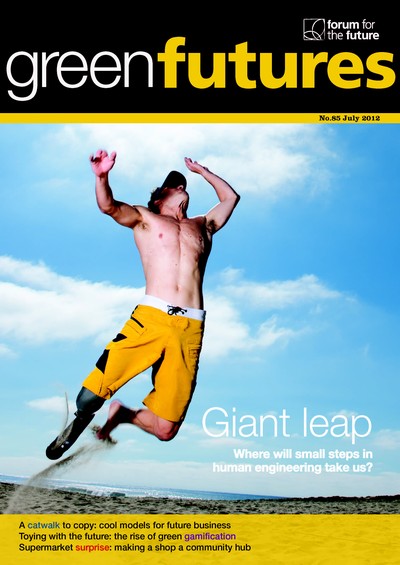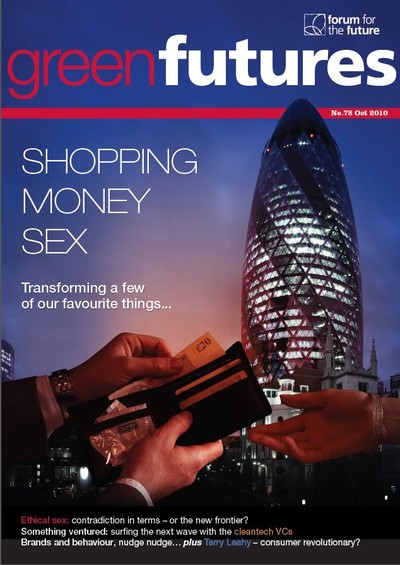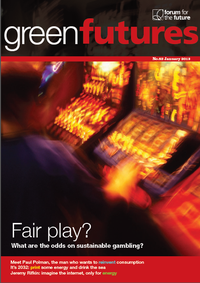Green Futures i — October 2010, #78

Green Futures
Green Futures is the leading magazine on environmental solutions and sustainable futures. Founded by Jonathon Porritt in 1996, it is published by Forum for the Future.
- 199 (51)
- United Kingdom
- Four issues a year
- First issue 1996
Enjoyed a fairly traded lapdance lately? Or watched some ethically certified porn? No, me neither. And not just because that kind of thing doesn’t really float my boat. With a few notable exceptions – a Coco de Mer Fairtrade, handcrafted leather paddle anyone? – you just can’t buy sustainable sex.
Why? Because the ‘adult entertainment’ sector has been left blissfully untouched by the world of sustainability and CSR. Many a consultant who happily trumpets their ‘positive engagement’ with oil, arms or even tobacco companies, would shrink from the thought of cosying up to the sex trade.
And they wouldn’t be alone. For many people, the very idea of engaging with something of such dubious moral, let along legal standing, would be a sick joke. But as Anna Simpson points out (p16), this is one of the world’s oldest, largest and most ubiquitous professions – and, however much some might wish, it’s not about to go away. In ‘Sex: the next ethical industry?’, she makes a courageous and compelling case for the sustainability profession to enfold it in a “warmer embrace”.
Plenty of environmentalists wish that Tesco, too, would just go away. But love it or loathe it, it’s a fantastically successful company which has undeniable power to shift the whole economy down a more sustainable track – if it chooses to do so. In an exclusive interview (p31), CEO Terry Leahy reveals why he’s decided to set his sights on a zero-carbon future – and put his faith in a consumer revolution.
There’s no mistaking the power of brands like Tesco and other iconic market leaders to shift individual behaviour, too – a very topical concern. With everyone from Downing Street downwards in search of the perfect nudge, it’s timely to ask just how brands can do so for maximum sustainability benefit. In ‘Fire brands’ (p26), we find some answers. And in ‘Clean horizons’ (p20), we spot some promising candidates for the iconic brands of tomorrow (my bet’s on Better Place), as thrown up by the latest wave of cleantech venture capital.
If that all feels too breathlessly businesslike, you can always take refuge in the promise of Slow Money. As Judith Schwartz reports (p28), the unlikely combination of high-tech crowdsourcing and a strong sense of community is opening up whole new investment models. As yet, it’s small-scale, slightly quaint stuff: a farm here, a village shop there. But it’s already demonstrated that there’s more than one breed of savvy green investor: VCs are not the only suits...
So, from sex to Tesco to a slow money farm… this issue’s definitely a case (as Mao would surely say if he were with us today), of letting a hundred business models bloom. A positively polygamous approach to saving the world, in other words. It could even be quite sexy.
What do you think of this issue?
Sign up or Log in to join the discussion.




